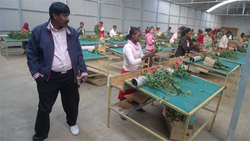The Guardian | 19 August 2011
By Beatrice Philemon
Tanzania has more potential in horticultural products than Kenya which is currently the industry leader in East Africa, Ramakrishna Karuturi, Managing director of Karuturi Global Limited from India has said.
Karuturi, who was recently in Tanzania to look for investment opportunities in agriculture said what the former country needs to bolster the industry, is to attract more investors and take serious measures to put up modern infrastructure to support the sector.
Karuturi said although Tanzania has suitable land that can be used for floriculture and good weather that can support the farming, it does not have airport infrastructure to support transport of horticultural crops.
“Just look, I had an interest in investing in floriculture in Tanzania, but after examining the airport infrastructure I found that it does not support floriculture. In the circumstances I have decided to embark on palm oil cultivation, rice and sugarcane farming,” the CEO of Karuturi Global Limited, the world leading holder of land banking said.
“Besides, it does not look appear that Tanzania has a dedicated charter for this sector once the investors begin to invest in,” he said.
He said Tanzania needs to change the mindset if it wants its horticultural potentials exploited to enable it to compete with countries like Kenya and Ethiopia.
Tourism and flowers exports are the key money spinners in the Kenyan economy.
Karuturi said he has instead to embark on palm oil and cereal cultivation in Tanzania and therefore plans to acquire land.
“I expect to acquire 311,700 ha of land that is similar to Ethiopia,” he said noting that he believes the government will support him to achieve his business goals.
In addition, he said he has applied for 1000 ha of land from the Government for production of rice, sugarcane and palm oil at Rufiji Basin, Coast Region.
He said once his projects bear fruits, soap and edible oil manufactures who are compelled to import raw materials from Malaysia and Indonesia would cease to do so.
He said Karuturi is a major recruiter in eastern Africa, with 10,000 staff, noting that Karuturi is the largest producer of roses in the world with 650 millions stems produced annually under green houses in India, Ethiopia and Kenya.
Presently the company has acquired 311,700 ha of land in Ethiopia for the cultivation of cereals, palm oil and sugarcane rendering Karuturi as one of the largest agricultural land bank holders in the world.
By Beatrice Philemon
Tanzania has more potential in horticultural products than Kenya which is currently the industry leader in East Africa, Ramakrishna Karuturi, Managing director of Karuturi Global Limited from India has said.
Karuturi, who was recently in Tanzania to look for investment opportunities in agriculture said what the former country needs to bolster the industry, is to attract more investors and take serious measures to put up modern infrastructure to support the sector.
Karuturi said although Tanzania has suitable land that can be used for floriculture and good weather that can support the farming, it does not have airport infrastructure to support transport of horticultural crops.
“Just look, I had an interest in investing in floriculture in Tanzania, but after examining the airport infrastructure I found that it does not support floriculture. In the circumstances I have decided to embark on palm oil cultivation, rice and sugarcane farming,” the CEO of Karuturi Global Limited, the world leading holder of land banking said.
“Besides, it does not look appear that Tanzania has a dedicated charter for this sector once the investors begin to invest in,” he said.
He said Tanzania needs to change the mindset if it wants its horticultural potentials exploited to enable it to compete with countries like Kenya and Ethiopia.
Tourism and flowers exports are the key money spinners in the Kenyan economy.
Karuturi said he has instead to embark on palm oil and cereal cultivation in Tanzania and therefore plans to acquire land.
“I expect to acquire 311,700 ha of land that is similar to Ethiopia,” he said noting that he believes the government will support him to achieve his business goals.
In addition, he said he has applied for 1000 ha of land from the Government for production of rice, sugarcane and palm oil at Rufiji Basin, Coast Region.
He said once his projects bear fruits, soap and edible oil manufactures who are compelled to import raw materials from Malaysia and Indonesia would cease to do so.
He said Karuturi is a major recruiter in eastern Africa, with 10,000 staff, noting that Karuturi is the largest producer of roses in the world with 650 millions stems produced annually under green houses in India, Ethiopia and Kenya.
Presently the company has acquired 311,700 ha of land in Ethiopia for the cultivation of cereals, palm oil and sugarcane rendering Karuturi as one of the largest agricultural land bank holders in the world.














